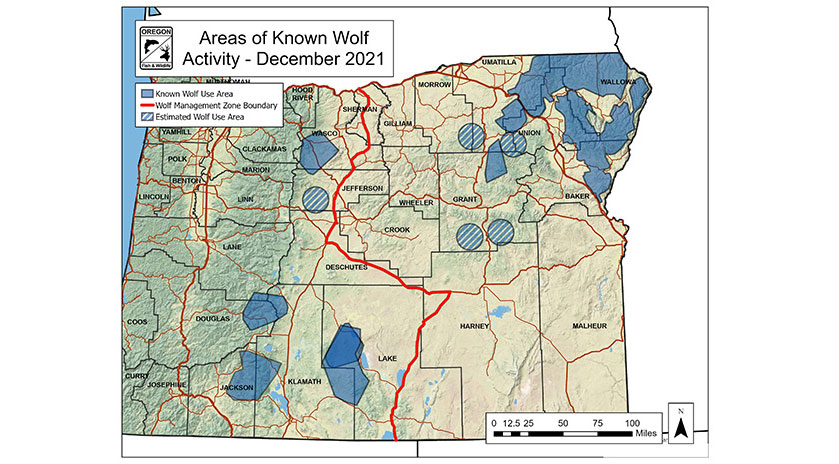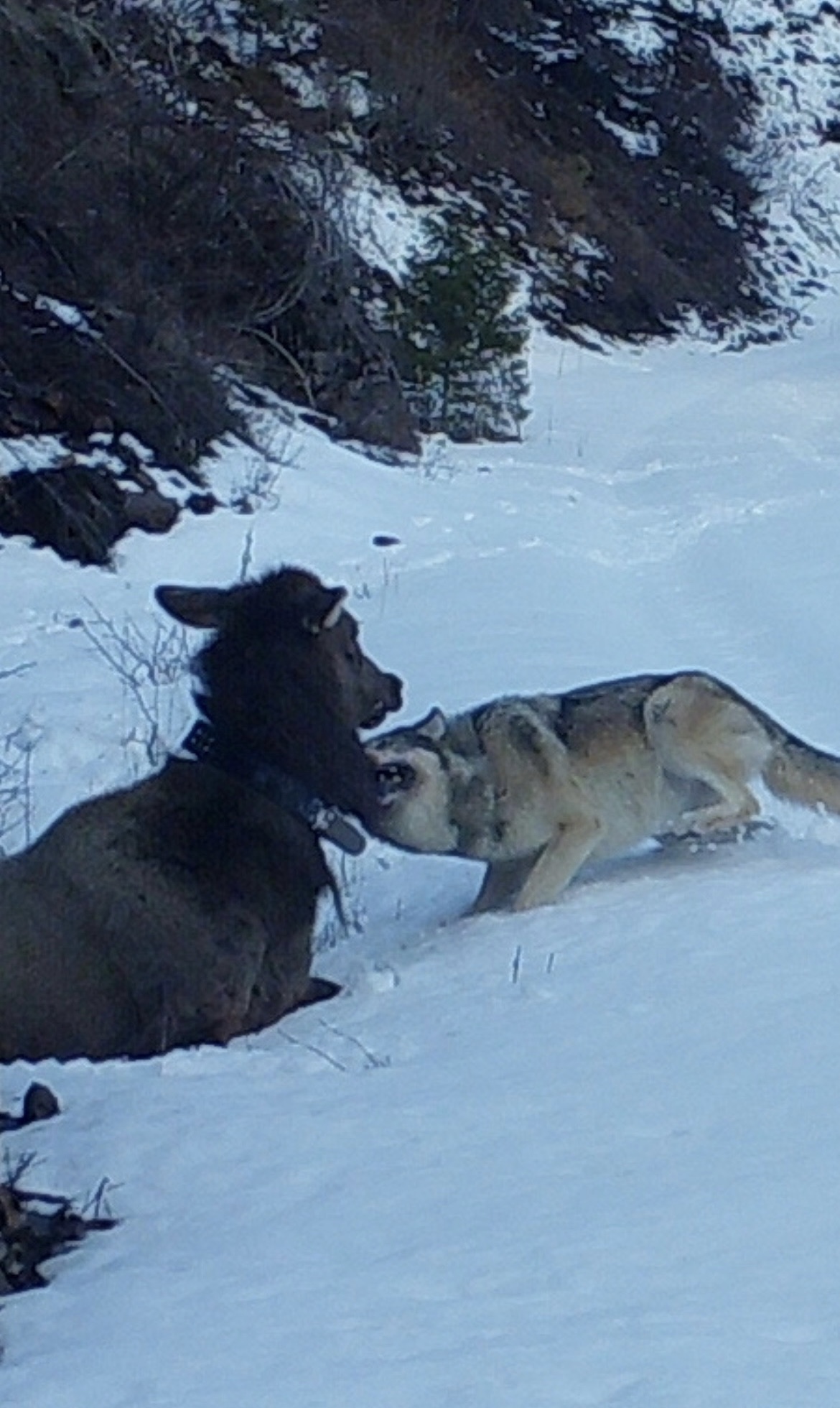In January, a game camera caught two images of a collared wolf killing a collared elk in Eastern Oregon. The scene will look familiar to most elk hunters in the West. An exhausted cow goes down in the snow, finally succumbing to the jaws of a wolf. The calf inside her will also die.
The fact that both of the animals in the photos were collared makes this encounter more intriguing. Each animal is a native species that was once hunted to extirpation and then reintroduced in the state. Both were wearing electronic collars that pinged their location via satellites traveling at 18,000 miles an hour through space. (Officials with the Oregon Department of Fish and Wildlife confirmed that the wolf was wearing an e-collar. The state is mandated to collar at least one individual from every pack, although this mandate has not always been met.)
The photos were captured by a rancher I know who wishes to remain anonymous because the topic of wolf management is so controversial. These two photos, and the circumstances around them, represent snapshots of what wolf and elk management in Oregon will look like in the future.
The History of Wolves and Elk in Oregon
If you want to understand why these photos are remarkable, you must first understand how we got here. The saga of wolves and elk is an old one in this region. The Blue Mountains have always been elk habitat. Even at the beginning of the 20th century when market hunting had nearly extirpated both Rocky Mountain and Roosevelt elk in Oregon, remnant populations were thought to exist in some of the remote and rugged portions of the Blue’s. Elk hunting was closed statewide in 1909.
In 1912, trains brought 15 elk from Wyoming to re-establish herds. The animals were then caged and dragged with teams of horses through deep snow on sleds to a pen at Billy Meadows in the Chesnimnus area where they could be quarantined and then released. The population grew to 450 head by 1926. A season for bulls was opened in 1933 where 579 bulls were killed by 2,440 hunters. Elk season was closed in Western Oregon in 1942 by the U.S. War Department, presumably to give men less of a reason to not join the war, but also to reserve an emergency food supply. Elk hunting resumed in 1943.

The wolf subspecies that occupied Oregon historically averaged around 70 pounds. The first legislative session in what was then called the Oregon Territory was formed in 1843 in order to establish a bounty to address the “problem of marauding wolves.” Wolves were trapped, hunted, and poisoned until the last recorded bounty of $25 was paid out in 1947.
The wolves in Oregon today consist of individuals and packs which have dispersed from Idaho, brought to the Frank Church Wilderness and Yellowstone in 1995. The first returning wolf came to Oregon in 1999 and was found in the John Day area. It was put in a crate and sent back to Idaho. Wolves started crossing the Snake River into Wallowa County Oregon in 2006 and had established known packs a couple years later. By the end of 2021, there were at least 175 wolves in the state, according to Oregon’s annual wolf report.
The Impact of Wolves

Significant livestock depredations started occurring in the state in 2010. One of the first happened within two miles of Joseph while I was home from college on spring break. We had seen calves killed by coyotes before, but this was something totally new and shocking. The bones were mostly consumed and little more than the head, hooves, and bloody hair remained on a large patch of dirty snow. I spent nights in the pasture that week, but saw nothing. It wasn’t clear to anyone what killed these calves until a decade of wolf depredation investigations taught area ranchers and biologists what to look for.
Fast forward to 2021, and Oregon ranchers ended the year with 679 missing cattle, a value of over $700,000. Three dogs were also confirmed to have been killed by wolves. Some of the hardest men and women you’ll ever meet will stand over their wolf-killed livestock with tears streaking their face, feeling helpless.
Wolves’ impact on wildlife is harder to quantify. Oregon’s elk population is increasing at a rate of about 1 percent annually, according to Darren Clark, a research biologist for the Oregon Department of Fish and Wildlife. These herds typically spend more time occupying private land and less time in the public forest.
Clark also explains that calf recruitment needs to be between 15-20 calves per 100 cows in order to maintain an elk population. Calf recruitment in the Snake River Unit, which has the greatest density of wolves in the state, has been below 10% for the last three years. All indications point to a precipitous crash in elk populations in the next decade. Perhaps the most significant damage occurs to pregnant females by inducing stress which causes less first estrus conception. Pressure from predation also causes abortions, low birthing weight, and low weight going into the fall.
A person can know nothing about wolves and still have feelings about them. Humans evolved alongside wolves, and without wolves there would be no black labs. Wolves are both the villains of fairytales and an idyllic icon of wildness to preservationists. The complexities of wolf management and livestock conflict are made cloudy by fear and emotion from all sides. But if there’s anything we know for sure, it’s that wolves are highly adaptable and they’ll expand their populations and ranges if left unmanaged. At least in eastern Oregon, photos like these will become more common.
